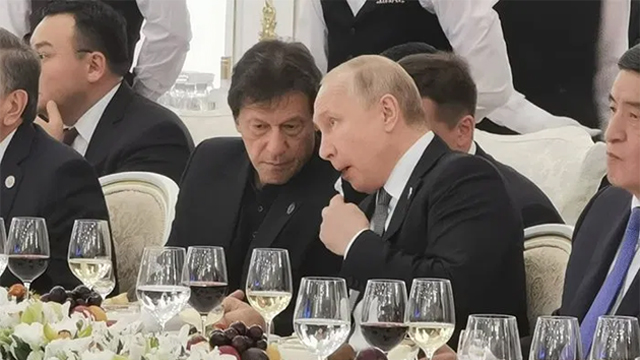Russian Foreign Minister Sergey Lavrov visited Pakistan last week –it was after a gap of nine years. His flyover could be characterized as the proverbial “breakfast in Delhi, lunch in Islamabad and dinner in Kremlin” plan gone a bit not as well in Delhi –Indian Prime Minister Narendra Modi did not give audience to Lavrov.
“I came with a message from my president that tell Pakistan we are open for any cooperation, whatever Pakistan needs Russia is ready for it…if you’re interested in gas pipelines, corridors, defense or any other cooperation, Russia stands ready for it.” (Lavrov said in a closed door meeting in Islamabad).
RELATED: Lavrov From Russia With Love Visits Pakistan
“In other words, the Russian president offered us a blank check,” a Pakistani government official who requested not to be named because of the sensitivity of the issue said. (Read full report in The Express Tribune).
“Take it as a great opportunity for diversifying our Foreign Relations,” says Amb. G R Baloch. “The civil-military hybrid is working”, says an observer in Islamabad.
What’s on the table: North-South (Karachi to Lahore) gas pipeline; reviving the Pakistan Steel Mills, interest in hydroelectric projects; “special military equipment”; Russian air defense systems, etc.
The official, according to the paper, revealed that Putin had conveyed to Pakistan through his top diplomat that Moscow would help Islamabad in any manner –something that would complete the Pak-Russia ties from being Cold War foes to friends.
What’s behind this? A senior Pakistani defense official told DesPardes that “a new world order is in the making and so are new blocks in the region”. Observers agree.
An expert specializing in US-China relations and South Asia affairs –based in Asia-Pacific tells DesPardes that:
1. The international security system is experiencing shifting coalitions and strategic uncertainty.
2. The era is characterized by post-unipolar ‘systemic transitional fluidity’.
3. The fundamental drivers defining this fluidity are the U.S. determination to extend its post-Soviet unipolar systemic primacy into the indefinite future.
4. China is equally robust with its determination not to allow foreign powers to dictate its permanent subordination within a system it did not create.
5. And, Russia’s quest for re-asserting its eminence within the system which its size, nuclear arsenal, economic potential and history lead it to believe it deserves.
6. As U.S. primacy-driven constraints being imposed on Sino-Russian power generate a reaction, this central dynamic creates space for Pakistan and similar actors to adapt their own policies to defend and advance their core interests and agency with new linkages.
7. As India is increasingly incorporated into the US-led anti-China coalition (Quad), Russia and Pakistan find it reasonable to expand bilateral cooperation.
8. Pakistan’s membership of the SCO grouping (with India and Iran) offers it added flexibility in pursuing wider regional ties promising perceptual expansion of its ‘strategic depth’.
9. Deepening Sino-Russian collaboration and Pakistan’s longstanding ties to China also encourage the pursuit of new opportunities Russia offers.
10. As Delhi moves closer to D.C., it is possible that Islamabad will develop closer proximity to the Zhongnanhai-Kremlin defensive axis. We are likely seeing the early stages of such trends today.
These developments are bringing Russia, China and Pakistan together. “It’s an important development,” the senior Pakistani defense official says. He spoke on condition of anonymity as he’s not authorized to comment officially.
“The Eastern Block will include China (and BRI influence block), Russia, Iran and Pakistan. The Western block will be the Quad (USA, India, Japan and Australia) and its allies”.
Islamabad is hoping that Putin would visit Pakistan. Russia is concerned that Indian tilt toward the U.S. would pose threat to its interests. as the two countries have been traditional allies since the Cold War. Russia remains India’s largest arms supplier with 49%, France 18% and Israel 13%, followed by the US in the fourth place.
Meanwhile, amid the lockdown, the mask and the social distancing, I plan to take nostalgia trip and watch Dr. Zhivago again:
Irshad Salim, Islamabad









Mr. Putin is the boldest leader the world has seen in this decade. His initiative towards Pakistan must be taken as positive and we should move forward in foreign policy in Russian-Chinese collaboration
which is the futuristics. We experienced enough with US; no need to reiterate they proved untrustworthy friend. Relations with India is a sensitive issue until such time Kashmir dispute is taken out by India from cold store to face the realities of 21st century taking into account more economic gains and care for people – West progressed on such policy after WWII. India and Pakistan must think to provide food, education and healthcare to its people rather than destroying human beings to live as animals – responsibility lies on India as larger country. Well done Mr. Putin; Pakistan Zindabad!